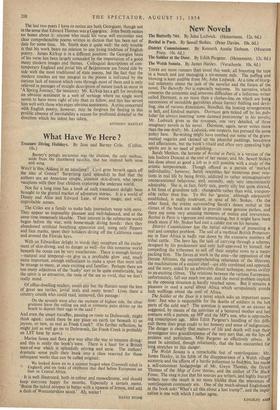What Have We Here ?
Barney's pelagic paramour was the abalone, the only mollusc, aside from the chambered nautilus, that has inspired both verse and song.
WHAT is this, Aldous in an aqualung? Cyril gone berserk again off the isles of Greece? Surprising (and splendid) to find that the authors are an American couple, amateur skin-divers, who spend vacations with their four children exploring the undersea world.
Not for a long time has a book of such translucent delight been brought to the glutted market of adventure stories. It is a world of Disney and Alice and Edward Lear, of moon magic, and wild, improbable scenes.
The Criles are a family to make lady journalists weep with envy. They appear so impossibly pleasant and well-balanced, and at the same time immensely likeable. Their interest in the submarine world began before the war, with home-made diving hoods: then they abandoned artificial breathing apparatus and, using only flippers and face masks, spent their holidays diving off the California coast and around the Florida keys.
With an Edwardian delight in words they recapture all the excite- ment of skin-diving, and its danger as well—for this nonsense world beneath the ocean can be very treacherous. There is enough history —natural and temporal—to give us a profitable glow and, much more important, enough enthusiasm to make a sport that must still be strange to many, at once exciting and familiar. Perhaps there are too many adjectives of the 'husky' sort to be quite comfortable, but the spirit is so attractive, the taste of the sea so vivid, that we don't really mind.
Of office-dwelling readers, could any but the flintiest resist the lure of great sea turtles, jovial seals and sooty terns? Lives there a country cousih who could read, unmoved, this passage: On the seventh wave after the moment of highest tide, the silver grunions leave the rolling sea and in romantic pairs skitter up the beach to deposit their eggs in the sand ?
And even the smart traveller, pausing en route to Dubrovnik, might think again: could there be any place on earth (or beneath it) so joyous, so new, so real as Fresh Creek? (On further reflection, he might just as well go on to Dubrovnik, for Fresh Creek is probably an LST base by now.)
Marine fauna and flora give way after the war to treasure diving: and this is really the book's core. There is a hunt for a British man-of-war which is splendidly stirring and eerie. The authors' dramatic sense pulls their book into a class reserved for those infrequent works that can be called original:
We looked down on to a cannon forged when Cromwell ruled in 4 England, and on tusks of elephants that died before Europeans set foot in Central Africa.
It is well illustrated, both in colour and monochrome, and should keep everyone happy for months. Especially a certain menu. 'Braise the naked octopus in butter with a squeeze of lemon, and add a dash of Worcestershire sauce.' Ah, waiter!
DAVID STONB


































 Previous page
Previous page